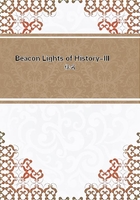
第27章
It mattered nothing that the Emperor was ashamed of his weakness;that he retracted; that he vowed vengeance; that he marched at the head of new armies. No matter that his adherents were indignant;that all Germany wept; that loyalty rallied to his aid; that he gained victories proportionate with his former defeats; that he chased Gregory from city to city, and castle to castle, and convent to convent, while his generals burned the Pope's palaces and wasted his territories. No matter that Gregory--broken, defeated, miserable, outwardly ruined--died prematurely in exile; no matter that he did not, in his great reverses, anticipate the fruits of his firmness and heroism. His principles survived him; they have never been lost sight of by his successors; they gained strength through successive generations. Innocent III. reaped what he had sown. Kings dared not resist Innocent III., who realized those three things to which the more able Gregory had aspired,--"independent sovereignty, control over the princes of the earth, and the supremacy of the Church." Innocent was the greater pope, but Hildebrand was the greater man.
Yet, like so many of the great heroes of the world, he was not destined in his own person to reap the fruits of his heroism. "Ihave loved righteousness and hated iniquity, and therefore I die in exile,"--these were his last bitter words. He fancied he had failed. But did he fail? What did he leave behind? He left his great example and his still greater ideas. He left a legacy to his successors which makes them still potent on the earth, in spite of reformations and revolutions, and all the triumphs of literature and science. How mighty his deeds! How great his services to his Church! "He found," says an eloquent and able Edinburgh reviewer, "the papacy dependent on the emperor; he sustained it by alliances almost commensurate with the Italian peninsula. He found the papacy electoral by the Roman people and clergy; he left it electoral by papal nomination. He found the emperor the virtual patron of the Roman See; he wrenched that power from his hands. He found the secular clergy the allies and dependents of the secular power; he converted them into inalienable auxiliaries of his own.
He found the patronage of the Church the desecrated spoil and merchandise of princes; he reduced it to his own dominion. He is celebrated as the reformer of the impure and profane abuses of his age; he is more justly entitled to the praise of having left the impress of his gigantic character on all the ages which have succeeded him."Such was the great Hildebrand; a conqueror, however, by the force of recognized ideas more than by his own strength. How long, you ask, shall his empire last? We cannot tell who can predict the fortunes of such a power. It is not for me to speculate or preach.
In considering his life and career, I have simply attempted to paint one of the most memorable moral contests of the world; to show the power of genius and will in a superstitious age,--and, more, the majestic force of ideas over the minds and souls of men, even though these ideas cannot be sustained by reason or Scripture.
AUTHORITIES.
Epistles of Gregory VII.; Baronius's Annals; Dupin's Ecclesiastical history; Voigt, in his Hildebrand als Gregory VII.; Guizot's Lectures on Civilization; Sir James Stephens's article on Hildebrand, in Edinburgh Review; Dugdale's Mosasticon; Hallam's Middle Ages; Digby's Ages of Faith; Jaffe's Regesta Pontificum Romanorum; Mignet's series of articles on La Lutte des Papes contre les Empereurs d'Allemagne; M. Villemain's Histoire de Gregoire VII.; Bowden on the life and Times of Hildebrand; Milman's Latin Christianity; Watterich's Romanorum Pontificum ab Aequalibus Conscriptae; Platina's Lives of the Popes; Stubbs's Constitutional History; Lee's History of Clerical Celibacy; Cardinal Newman's Essays; Lecky's History of European Morals; Dr. Dollinger's Church History; Neander's Church History; articles in Contemporary Review of July and August, 1882, on the Turning Point of the Middle Ages.
SAINT BERNARD.
A. D. 1091-1153.
MONASTIC INSTITUTIONS.
One of the oldest institutions of the Church is that which grew out of monastic life. It had its seat, at a remote period, in India.
It has existed, in different forms, in other Oriental countries.
It has been modified by Brahminical, Buddhistic, and Persian theogonies, and extended to Egypt, Syria, and Asia Minor. Go where you will in the East, and you see traces of its mighty influence.
We cannot tell its remotest origin, but we see everywhere the force of its ideas. Its fundamental principle appears to be the desire to propitiate the Deity by penances and ascetic labors as an atonement for sin, or as a means of rising to a higher religious life. It has sought to escape the polluting influences of demoralized society by lofty contemplation and retirement from the world. From the first, it was a protest against materialism, luxury, and enervating pleasures. It recognized something higher and nobler than devotion to material gains, or a life of degrading pleasure.
In one sense it was an intellectual movement, while in another it was an insult to the human understanding. It attempted a purer morality, but abnegated obvious and pressing duties. It was always a contradiction,--lofty while degraded, seeking to comprehend the profoundest mysteries, yet debased by puerile superstitions.